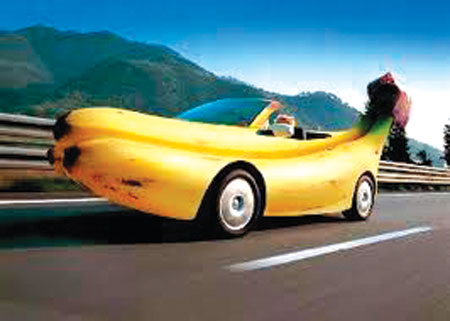 Fruit nanofibers can be used to manufacture automotive body and parts vision diagrams that can be used to make car dashboards, and may become the main material for a new generation of car bodies. People will always associate nutrient-rich fruits with food, beauty and health, and pick up delicious foods. Did you ever think about fruit or make a car? A few days ago, Brazilian scientists used fiber from fruits to develop a strong fiber plastic, which makes fruit-making cars no longer a fantasy.
Fruit nanofibers can be used to manufacture automotive body and parts vision diagrams that can be used to make car dashboards, and may become the main material for a new generation of car bodies. People will always associate nutrient-rich fruits with food, beauty and health, and pick up delicious foods. Did you ever think about fruit or make a car? A few days ago, Brazilian scientists used fiber from fruits to develop a strong fiber plastic, which makes fruit-making cars no longer a fantasy. Hardness is over 3 times that of ordinary plastic. For centuries, plant fibers have been used to make paper. Recently, scientists have discovered that plants can release a kind of ultra-fine nanofibers, and the width of 50,000 ultra-fine nanofibers gathered together is only equal to the diameter of a human hair. Recently, Brazilian researchers successfully developed a strong fiber plastic using ultra-fine nanofibers extracted from fruits. This plastic has passed the tests of automakers and is expected to be officially used in the automotive industry within two years.
At a meeting of the American Chemical Society in Anaheim, Calif., a Brazilian scientist publicized the invention.
Dr. Alciides Leo of Brazil’s State University of Sao Paulo, who led the study, stated that the ultra-fine nanofibers extracted from fruits are hard and the strength of the strong fiber plastics made from it is incredible. It is said that it is the world's strongest edge-resistant, flame-retardant fiber, Kevlar, which is generally used to make *** and lightweight armor. Fruit strength fiber plastics are 3 to 4 times harder than ordinary plastics, but they are 30% lighter.
Dr. Reo emphasized that this invention is an "ultimate" green technology innovation. The use of strong fiber plastic to make automotive parts such as dashboards, bumpers, and side panels will not only help reduce vehicle weight, but also save fuel. His research team hopes to use the strong fiber plastic as the main body material of the new generation of automobiles, and believes that in the near future, this material can also be used to make automobile engine parts.
Making Artificial Heart Valves There are many doubts about the use of strong plastics made of plant fibers in automobile manufacturing. In the 1950s, Volkswagen used a mixed material of cotton fiber and resin (also a kind of strong plastic) to manufacture a car that was designed for poor people. After the launch of the car, its performance was criticized. And considered to be one of the worst cars in history.
In this regard, Dr. Leo said that his research team members are trying to extract ultra-fine nanofibers from different fruits, trying to compare the materials of various types of ultra-fine nanofibers, hoping to study more hard, light and environmentally friendly Reinforced fiber plastic.
It is reported that the research team led by Dr. Leo has succeeded in extracting fibers from pineapple leaves and rhizomes, bananas and coconut shells, and agave plants to produce strong fiber plastics.
At present, the ultra-fine nanofibers extracted from fruits can also be used to reinforce other common materials like glass fibers. The reinforced material is harder, and has the characteristics of heat insulation, oil-water extravasation, and oxidation resistance compared with ordinary plastics.
Dr. Reo said that although the focus of the team's research so far is to replace the existing materials of automotive parts, the future use of materials made of ultra-fine nanofibers of plants will be even broader, and even replace steel and aluminum products. At the same time, the reinforced plastic can also be widely used in the medical field, such as: the production of artificial heart valves, ligaments and hip joints.
Pearlescent Masterbatch Co., Ltd. , http://www.nsmasterbatch.com
